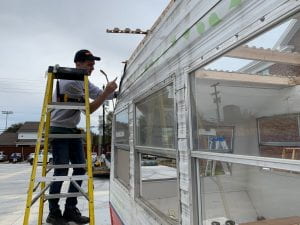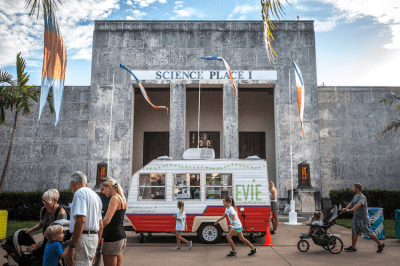The EVIE project is entering its third phase in the Global Development Lab at the Hunt Institute for Engineering and Humanity. Three years after its first public unveiling at Earth Day Texas in 2017, work on the mobile greenhouse has continued to push the boundaries of innovating a solution to Dallas’ fresh produce problem. The purpose of EVIE is to serve Dallas community members as a sustainable opportunity for fresh produce by encouraging their participation in the harvesting, maintaining, and general operations of a greenhouse.
EVIE’s name was derived from Eve, which is commonly associated with life and beginnings, appropriately matching the Institute’s goals for the project. In 2018, the Department of Agriculture identified 88 separate food deserts in Dallas County. Over half of the food deserts were in three southern portions of Dallas, encompassing close to 400,000 residents. EVIE is designed to be movable through areas lacking fresh produce and easily replicable to increase the availability of fresh produce across the food deserts. The first phase of EVIE focused on designing an easily replicable greenhouse model that could function in recycled environments, including an old, rickety Shasta trailer. In Phase II of the project, researchers from the Hunt Institute examined techniques that could facilitate irrigation, solar access, and temperature controls needed to maintain the greenhouse in any environment.

Before Phase III could begin, the SMU Engineers Without Boards Plant Lab team gave EVIE a much-needed makeover. The roof had a leak. The makeover was completed right before spring break when the COVID-19 Global Pandemic hit the Unites States. Students are working remotely but unable to physically work on EVIE or in Labs as of June 2020. When they are able to return and resume work, Phase III of EVIE plans to make EVIE nearly autonomous to limit work and outside effort required to maintain the greenhouse. To achieve sustainability, EVIE will run off a solar panel to supply power for any water pumping or climate control measures. In addition, a rain collection system will provide irrigation to the individual planters. Through both of these additions to the current mobile greenhouse, EVIE will be able to provide fresh, healthy produce without requiring significant labor or effort on the part of community members.
The findings from this project hope to contribute to the agriculture value-chain development in rural and urban areas by promoting community involvement and educating local schools, food banks, and churches on environmentally sustainable, hydroponic, aeroponic, and vertical greenhouse growing methods.
To read more about the Hunt Institute’s work to develop future-focused solutions to some of the world’s biggest problems, please click here. For the latest news on the Hunt Institute, follow our social media accounts on LinkedIn, Facebook, Twitter, and Instagram. We invite you to listen to our Podcast called Sages & Seekers. If you are considering engaging with the institute, you can donate, or sign-up for our newsletter by emailing huntinstitute@smu.edu.


